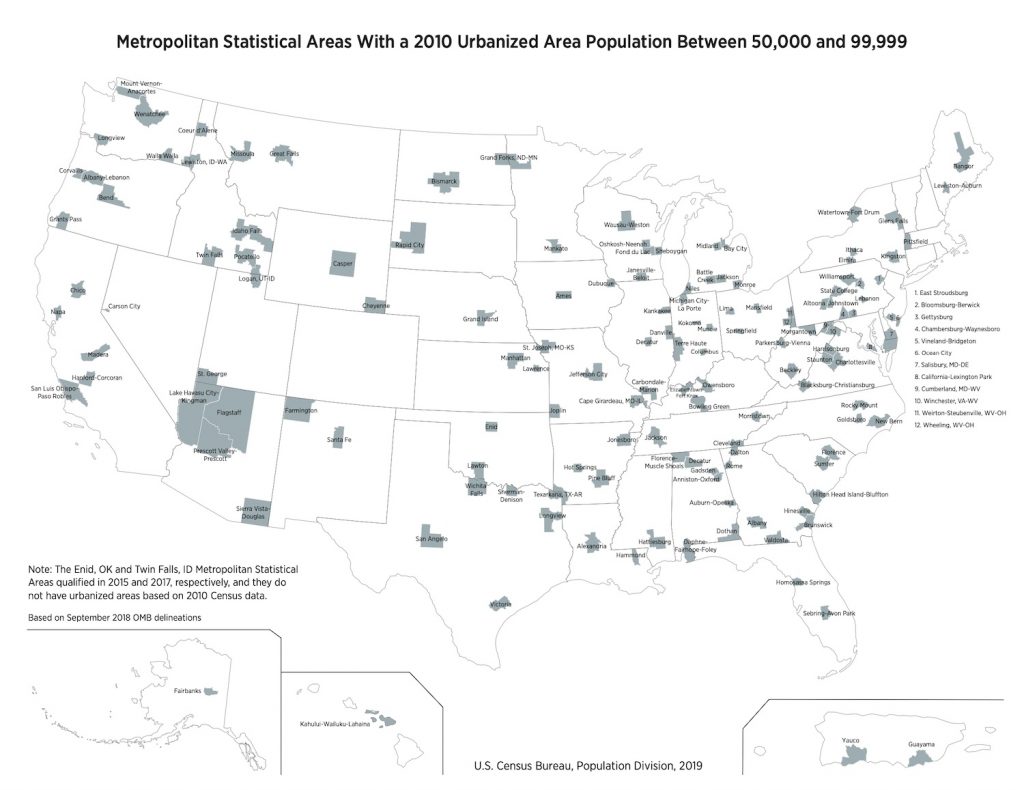Last January, the day before Inauguration, the federal Office of Management and Budget published a recommendation from its Metropolitan and Micropolitan Statistical Area Standards Review Committee to change the minimum population for deeming a place a “metropolitan area” from 50,000 to 100,000. That change would redesignate 144 urban areas from metropolitan to micropolitan:

The proposal would leave the lower bound for micropolitan areas at 10,000.
Senator John Thune has joined Arizona Senator Mark Kelly in proposing legislation to prevent the OMB from reclassifying Rapid City, Flagstaff, and 142 metros as micropolitan areas. Senator Thune frets that the redefinition would “adversely affect” the redesignated communities incentivizing bad population growth policies (what? I thought bigger was always better) to get the new micros back to metro status deterring young professionals from migrating to the new micros because they only want to live in cities with the Metro™ brand. (By advancing that thesis, Senator Thune makes Aberdeen, Brookings, Watertown, and other current South Dakota micropolitan areas look bad, but never mind that.) Senator Thune also warns that relabeling current metros as micros could disqualify them for certain federal funding (John, your socialist slip is showing again). Pushing 144 cities into the micro category could also crowd existing micros and rural communities away from whatever troughs of federal welfare dollars are earmarked for smaller cities.
But the OMB has stated its proposal is “not designed to serve as a general-purpose geographic framework applicable for nonstatistical activities or for use in program funding formulas.” The only way this redefinition could hurt Rapid City and Flagstaff is if Senators like Thune and Kelly wrote legislation that tied population to the OMB definition instead of setting explicit population thresholds of their own. If existing legislation uses those statistical designations for non-statistical purposes, Congress could just as easily revise that legislation to replace references to the OMB definition as ban a government agency from defining its statistical terms.
The best reason I can see for opposing this statistical change is a good globalist statistical argument—doubling the minimum population for what the United States calls a metro would create an arbitrary break in historical data that would run counter to United Nations standards:
…the recommendation provides no empirical, scientifically sound formula nor explanation for what will trigger future threshold increases, nor how they should be calculated, leaving future changes open to political manipulation. Changing the threshold also creates a break in series, posing significant complications for longitudinal statistical analysis and tracking rural realities over time.
There is no explanation of whether other options were considered. For example, why push locales into nonmetro status instead of subdividing urban areas into metropolitans and “mega-metropolitans?” The recommendation also conflicts with an endorsement in March 2020 by the United Nations Statistical Commission (the global forum of national statisticians in which the U.S. chief statistician participates) of a standard to facilitate comparative analysis among countries, using 50,000 as the threshold for an urban center [Anthony F. Pipa and Natalie Geismar, “The New ‘Rural’? The Implications of OMB’s Proposal to Redefine Nonmetro America,” Brookings Institute, 2021.03.18].
So Senator Thune’s proposal to keep the definition of metropolitan areas as “50K population and above” really puts a blue beret on American statistics and keeps us in line with the United Nations and the One-World Order. Hooray for John Thune’s globalism! Next up, America finally adopts the metric system!
Thune will bend over backward to avoid the election integrity issue.
This is another largely non-issue.
I miss the definition of “socialism” that states the government cannot procure services from the private sector. The government should be a customer of private firms (with some exceptions) rather than growing the corrupt deep state aparatus.
I’ll reiterate, there will be a string of non-issues to try to defray the election integrity issue. Unfortunately, the recent election issues (I’ll be nice) are seared into every blue dog, conservative, patriot, extremist (left and right), man, woman, and child who thought the country was NOT overtaken by a sordid cult.
It’s nice that this “conspiracy theory” is now the main stream view.
No more foreign entanglements!
America must work for Americans.
We must define “American” carefully, and protect the ballot box from any more shenanigans.
Election integrity or bust!
After the proven success of the last Presidential election, every American voter should have universal mail in voting (all voters receive a mail in ballot without needing to request one) as one of their options.
-Going to the polls and early voting are still options, also.
-Colorado has had it for 18 years and the statistics speak for the integrity and balance of the option.
-Neither political party has shown a negligible increase or decrease in winning or losing.
-Both party’s have however shown an increase in voter turnout.
The Hyper/partisan OMB trumpist had a nefarious reason and Thune carries the ball for McConnell so this last Trump Admin machination is dangerous.
nhttps://en.m.wikipedia.org/wiki/Russell_Vought
Where was Thune when Pluto was demoted, that was a much bigger issue.
CORY, OMB used that language to try to justify not thinking about the ramifications of their proposed actions. The fact is, just about all of the federal government (and many state governments) use OMB Metro vs Micro definitions for classifying and distributing funds. So there would be major ramifications in funding streams and dramatic increased competition for the fewer resources allocated to micropolitan communities.
Not to mention the statistical hack-n-slash of the OMB which proposed to arbitrarily double the size of a metropolitan area without also doubling the minimum threshold for a micropolitan area.
Thune was right to chastise OMB; they were getting it from all sides, and justifiably so.
Mark’s comment about Pluto nails it!